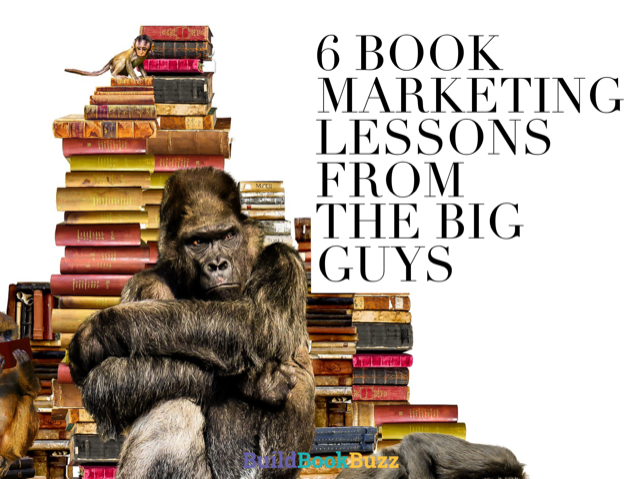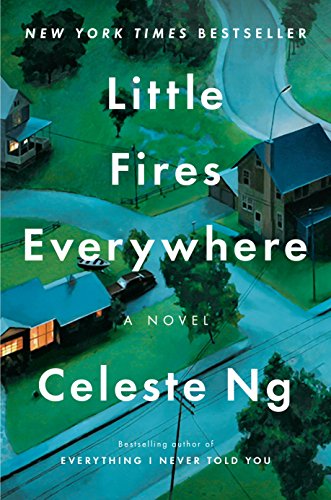
The Goodreads blog recently published a detailed case study about how Celeste Ng’s second book became a best-seller. “Case Study: How Penguin Press Made ‘Little Fires Everywhere’ a Roaring Success” outlines the publisher’s marketing support, which includes Goodreads activity.
It would be easy to dismiss this article as irrelevant to you and me and most other authors. The vast majority of novelists – regardless of the publishing model used – simply aren’t enjoying Ng’s success.
Your books aren’t New York Times best-sellers and don’t achieve more than than 16,000 reviews on Goodreads. You don’t ink TV series deals with Reese Witherspoon, either.
I don’t think it’s irrelevant, though. In fact, I think you can learn a lot from this case study.
Even after you take into account that you don’t have her fame and success (yet) and how much Ng’s reputation played into her second book’s success, there’s still lots to learn from this case study.
Here are six book marketing lessons for novelists from the Goodreads article.
1. Write a damn good book.
You can’t be certain you’ve written a great story unless strangers tell you that.
So do your best, pay a professional editor to improve it, and get feedback from people who won’t be concerned about hurting your feelings.
This is important because so much success in fiction is driven by good word of mouth. People don’t recommend bad books with their friends.
As the Goodreads case study concludes, “Ultimately, though, all the great book marketing tools in the world would not have worked without an amazing story.”
2. Start early.
The Penguin team started marketing Little Fires Everywhere nine months before its publication date.
While you might not use the same strategy and tactics that Ng’s publisher did nine months out, your book would benefit from efforts that begin long before your publication date, too.
3. Work to build a fan base, then nurture and leverage it.
This is your platform – your built-in audience that’s waiting for your book to come out. You don’t build a platform overnight. It takes time.
If your audience is young and female, figure out Instagram and Goodreads, because that’s where they’re talking all things books.
Follow the followers of the top authors in your genre. Then give those readers value. Maybe you involve them in your process so they feel invested in your work. Ask their opinions on storylines, character names, or titles. Comment on what they’re doing.
The point is: Find the right readers and talk to them.
4. Distribute as many advance review copies – ARCs – as possible.

The case study doesn’t say how many ARCs Penguin gave away through NetGalley and Edelweiss, but there were 23 reviews up on Goodreads by the end of May (for a September publication date).
Many authors remain reluctant to give away review copies. They think it diminishes their book’s value or they’re worried about piracy.
Just do it.
If you’ve written a good book and you’re getting it into the right hands, ARCs will help boost the number of reviews, especially on Goodreads.
As for piracy, NetGalley has a mechanism that protects against that.
5. Identify and connect with key influencers.
In Ng’s case, several top Goodreads reviewers got early copies and reviewed the book. Who influences your readers? Find them on Goodreads, or find Goodreads reviewers who have reviewed books like yours.
Look for them on Facebook, Instagram, Pinterest, and Twitter, too. Develop and nurture relationships with them.
6. Let reader feedback guide your marketing messages.
Penguin’s team used early reader reviews to shape marketing messages. You can do that, too.
Even less-than-favorable reader reviews can give you the information you can use to change your book’s description so that people don’t expect X and get Y.
Study reviews to identify words used to describe the book. And, if your writing is compared to author X’s books more than once, work that comparison into your book’s description and keywords.
Find a popular book that’s similar to yours and study what the author and publisher have done to market it. You might be surprised by what you uncover — and how you can use that new knowledge.
What’s the one marketing tactic you know works for your book? Please share it in a comment.
Click here to view the original web page at buildbookbuzz.com
Excellent tips on marketing your latest book. I especially like the independent review of your work before going to press so you can ensure quality, and the building a tribe of influencers who by the way can serve as your Advanced Copy reviewers as well as your future street team. I probably will be another 8 to 10 months on writing my affiliate marketing book but have already joined an authors launch group in the same niche and have around 200 influences in the same niche ready to do exactly that.
Marios, six very relevant tips for writing, and not just books. These tips should also be used by any website owner and blogger. I have read so many books and articles that are appallingly written when it comes to writing mechanics and accuracy. Now I know hiccups can occur but when the amount reaches a high number in the same book, that’s a real turnoff for me.
Whatever you are writing, the number one is make it a captivating story. And you’re right about a good editor. I would add, get a capable proof reader too. Generally with websites, if you can’t get either of these who do this for a living, find someone else, who will set your articles right. You might have to pay for it but the shorter articles also benefit highly from this process.
These tips should be copied and posted near everyone’s computer for reference.
Well stated tips.
Ciao
Helen
Hey Helen,
Thanks for your kind words. Sometimes outsourcing is the best thing to do – especially with an editor and a proofreader. You might miss important edits or grammar and syntax errors without them.
Thanks for stopping by!
Hi Mario, I’d love to know more about the advance review copies! Thanks for sharing these tips with us as I’m launching a revised eBook soon. I’ve got some work to do!
Thanks for this great article
Actually i found this article very useful and a valuable asset to all publishers. Sometimes we put in much time and devotion in creating things. Then we put less in creating awareness of those valuable products we have created. These lessons are a must-read for all publishers.
Hey there,
Indeed. There’s a rule of thumb regarding this. 20% creating content and 80% promoting it.
Thanks for the comment 🙂
Marios
What I feel is interesting about the lessons you brought, is that they show that you NEED a team or at the very least a diverse skill set and a clearly outlined plan if you want to succeed.
It’s not just about the writing. You also need to socialize, build connections, and find ways to market your book.
You can’t just focus on one thing only and neglect the other aspects. Ideally I feel like you do need to have a team since alone you can’t divide your effort as it should be and will end up being jack of all trades master of none.
From another angle, doing some social media marketing yourself will allow you to add some personality and allow you to brand yourself personally as an author.
Hey Faheem,
You do indeed need a team. When you start as a solopreneur though, you might need to bootstrap. So, you need to focus on one thing at a time, and master it. Then go on to the next.
You can outsource, or hire a Virtual Assistant to perform the tedious tasks.
Thanks for stopping by!
Marios